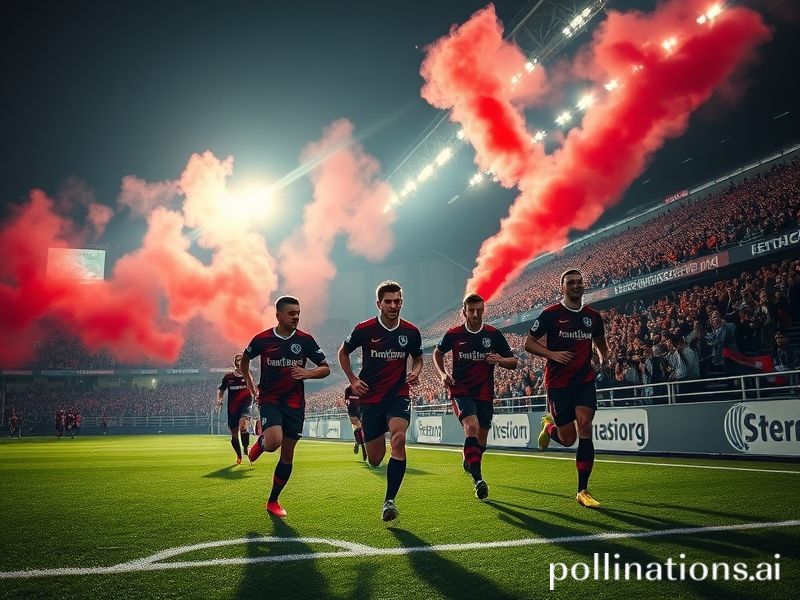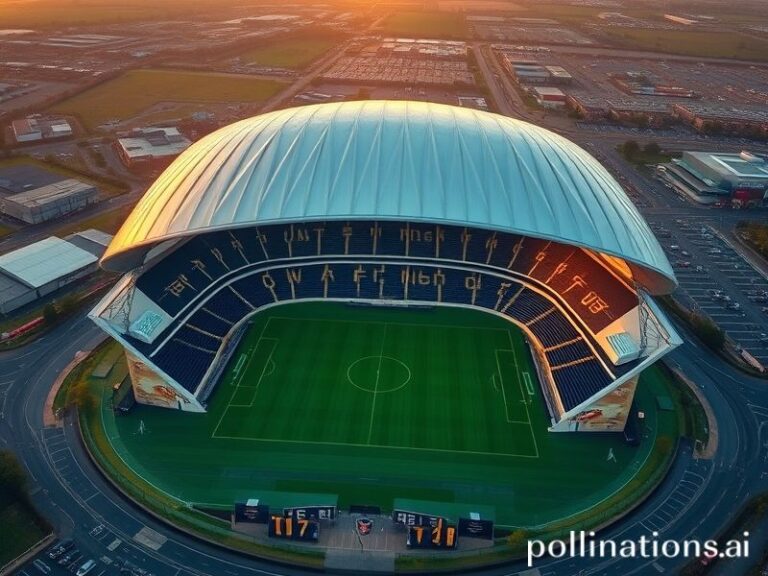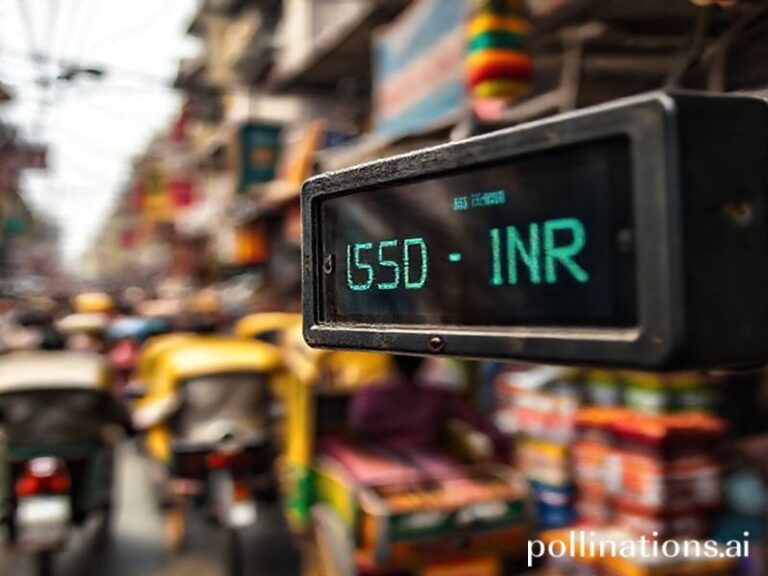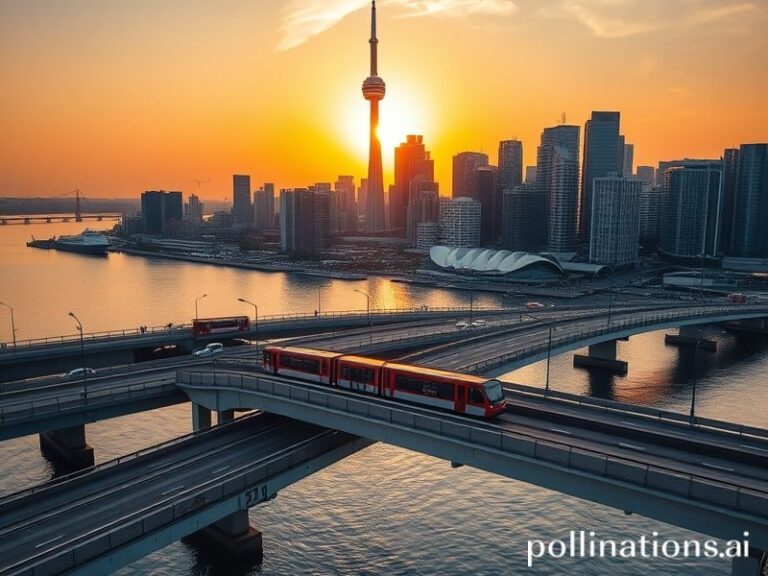Frankfurt FC: How a German Football Club Became the World’s Most Expensive Comfort Blanket
Frankfurt FC and the Global Art of Pretending to Care About Football
By Our Man in the Departure Lounge, still clutching a boarding pass that smells of duty-free gin and existential dread
Frankfurt am Main, 3:47 a.m. local time—the hour when even the airport’s pretzel ovens go quiet and the currency-exchange kiosks stare blankly at their own neon reflections. Somewhere beyond the perimeter fence, Eintracht Frankfurt—renamed here as Frankfurt FC for the sake of readers who think Bundesliga is a brand of knock-off cologne—has just qualified for yet another European night that will be beamed into hotel bars from Lagos to Lima. Which means, in the grand economic scheme of things, that yet another city will temporarily reroute its insomnia to a patch of grass beside the Main River.
The world, you see, has agreed to pretend that a club founded when Bismarck still sported a full head of hair is suddenly central to the human story. And who are we, the international press, to argue with such collective delusion? After all, the same cognitive loophole keeps NFTs, the United Nations Security Council, and oat-milk lattes in business.
Let’s zoom out, satellite-style. From the stratosphere, Frankfurt resembles any other mid-sized financial hub: a cluster of glass rectangles designed by architects who clearly lost a dare, surrounded by suburbs that smell faintly of both diesel and resignation. Yet slap a Europa League semifinal on the calendar and the entire metropolitan area performs the miracle of self-branding. The local tourist board, whose default expression is “mildly inconvenienced,” suddenly discovers adjectives. Historic half-timbered houses are scrubbed until they look like they’ve been Photoshopped by an intern on amphetamines. Even the homeless pigeons appear to unionize, demanding appearance fees.
Globally, the implications are as absurd as they are profitable. In Singapore, proprietary algorithms crunch Frankfurt’s expected goals as diligently as they calculate tomorrow’s rice futures. In Buenos Aires, a barrio kid streams the match on a cracked phone screen held together by masking tape and hope, learning that life is unfair—especially when the referee is Portuguese. Meanwhile, in a WeWork in Brooklyn, a start-up pitches “EintrachtCoin,” a blockchain token that rewards fans for emotional engagement, measured by the dilation of their pupils during set pieces. The founders assure investors it’s “totally not a pyramid scheme,” which, translated from fintech-speak, means it absolutely is.
And then there is geopolitics, that reliable circus tent where sports always get dragooned into clown duty. Qatar Airways, official airline of the club and unofficial whitewasher of labor-law reputations, slaps its maroon logo across the stadium like a Band-Aid on a bruised conscience. Russian oligarchs—those who haven’t yet tumbled down elevator shafts—mutter darkly about “soft power” while scrolling Frankfurt’s transfer budget on Bloomberg terminals. Even the Americans muscle in: a private-equity consortium from Cleveland, still dizzy from turning Arsenal into a glorified ETF, circles the club like vultures who’ve read too many Harvard case studies.
All of which raises the perennial question: does the ball ever truly cross the line, or does it merely bounce off the ever-expanding bubble of late-capitalist spectacle? Frankfurt FC’s ultras, bless their black-and-white hearts, would insist the answer is love, community, and that primal urge to set off flares banned in twelve countries. The club’s accountants, however, will tell you the real score is broadcast rights, stadium naming deals, and a merchandising strategy that can sling retro jerseys from Hanoi to Houston faster than you can say “var-assisted handball.”
Come Thursday night, the world will once again pretend that 22 millionaires kicking polyurethane matters more than the melting ice caps or the fact your landlord just raised the rent. We’ll tweet our hot takes, place our micro-bets, and wake up with the same mild hangover that tastes of regret and bar-rail gin. Frankfurt may win, lose, or draw—ultimately irrelevant in a universe slouching toward heat death but momentarily crucial to quarterly revenue targets.
And yet, somewhere in that stadium, a ten-year-old will experience the unrepeatable alchemy of seeing her first live goal and deciding—for roughly ninety minutes—that everything else can wait. If that isn’t the most expensive, most ridiculous, most beautifully human form of hope we’ve yet engineered, then I’ve clearly spent too long in this departure lounge inhaling recycled air and the faint smell of someone else’s fries.
Boarding now. Next stop: wherever the next collective delusion is scheduled for kickoff.







